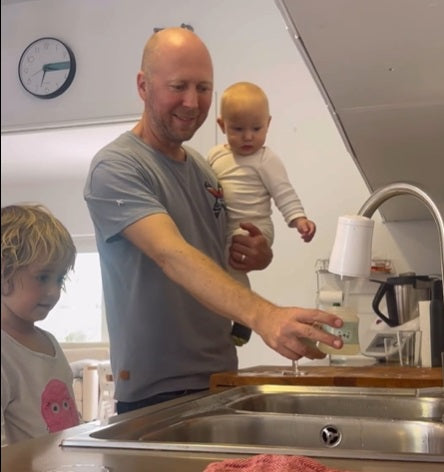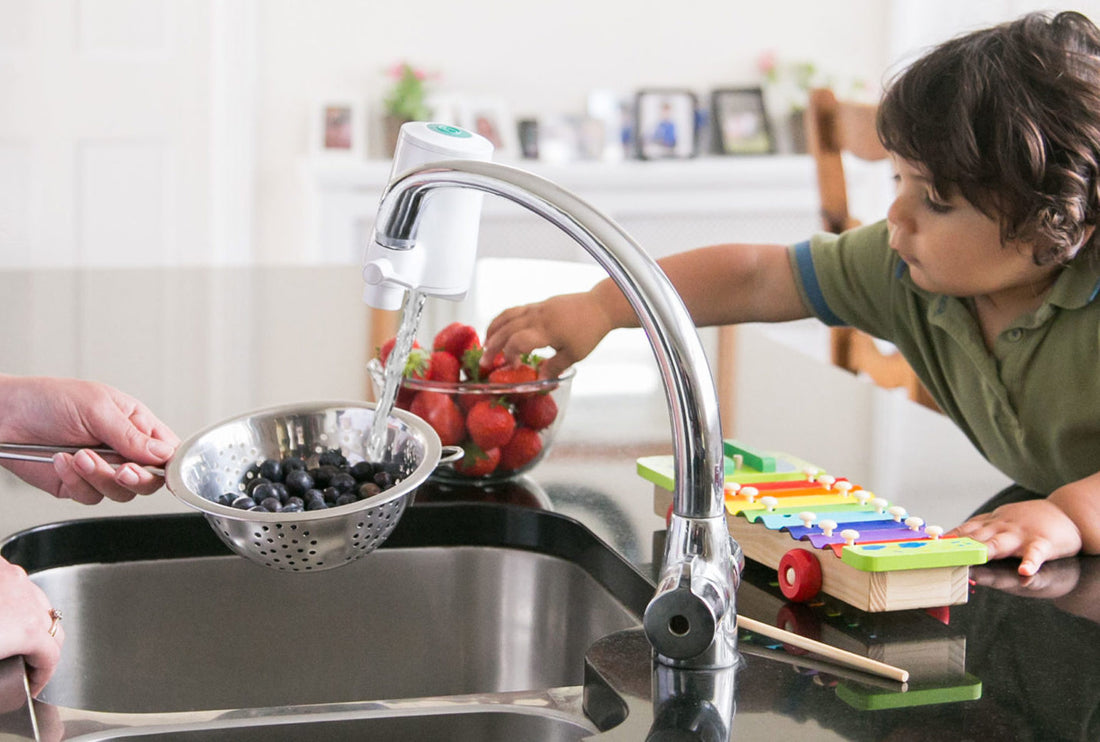We often get asked if tap water or more specifically is filtered tap water safe for babies? And what is the best water filter for babies?
As parents we are all super concerned about the well-being of our little babies. Two of the co-founders at Tapp Water recently became parents and therefore spent a lot of time researching this topic before making a decision. In this article we will share our research and conclusion.
Note that babies less than 6 months should not be drinking tap water so this article refers to water used for baby formula and drinking water for babies older than 6 months.
1. Why do we boil the water?
Babies have immature immune systems and therefore we want to make sure that the infant doesn’t get exposed to bacteria unnecessarily the first 6 months.
Therefore there are two reasons to boil water:
a) Neither tap water or bottled water is sterile straight from the source.
b) Powdered infant formula milk is not sterile. Even though tins and packets of milk powder are sealed, they can still contain bacteria.
By boiling the water for 1-3 minutes you can be sure that bacteria are gone. Adding the boiled water to the formula, according to some sources, also means that the formula milk will be safer to consume.
Boiling water does not remove other contaminants such as lead, nitrates, micro plastics or substances often added to the water including chlorine, chloramine or fluoride.
2. Is your tap water safe to drink?
Drinking water quality is location dependent. In most of Europe and many other countries around the world public tap water is safe to drink after boiling but you never know for sure.
Recent incidents with lead in Flint, Michigan and PFOAs in the Venento region of Italy show that water could be contaminated even when locals governments report it to be safe.
Another problems is newly identified contaminants such as microplastics found in over 80% of all tap water. We simply don’t know yet what the health impact is for humans but we know that it’s harmful for micro-organisms.
So is tap water safe for babies and baby milk?
For the time being experts point to tap water being safe for infants. NHS in the UK as well as most other health institutions in Europe recommend tap water rather than bottled water for infants.
“Bottled water is not recommended to make up infant formula feeds for your baby. This is because it's not usually sterile (free from bacteria) and may contain too much salt (sodium) or sulphate.” – Source: NHS Website
In Spain the Scientific Committee of the Spanish Agency for Consumer Affairs and Food Safety recently proposed that "Suitable for the prepartion of infant food and baby formula":
- Must meet the specifications on the chemical parameters for mineral water (see Annex IV, Paragraph 1, Part B
of Royal Decree 1798/2010 and Regulation (EU) No 115/2010) - The organoleptic and purity conditions specified in Annex I of Royal Decree 1798/2010.
- Should take into account the following reference chemical parameters: boron (0.5 mg/l), calcium (150 mg/l), cyanides (10 µg/l), chloride (100 mg/l), CO2 (250 mg/l), copper (0.2 mg/l), chromium (5 µg/l), fluoride (0.5 mg/l), magnesium (50 mg/l), manganese (50 µg/l), nitrate (10 mg/l), nickel (20 µg/l), dry residue (1,000 mg/l), sodium (100 mg/l), sulphates (200 mg/l), uranium (2 µg/l) and zinc (0.1 mg/l).
To see if your tap water is baby safe check your local water in our Water Quality Database and compare with the values above.
3. Is bottled water safer than tap water for babies?
The simple answer is no. A longer answer is available here. Bottled water may contain too much sodium or sulphates and it could also contain lead, nitrates or other harmful contaminants as quality testing is not as frequent as for tap water. There may also be bacteria as it’s not sterile.
In addition to this 92% of bottled water was found to contain microplastics in a recent test by OrbsMedia. As per above we don’t yet know what human impact is but you might not want to test your luck with a newborn baby.
Therefore avoid using bottled water for your infant if you can and if you must use it then make sure that the content is safe and that it’s boiled first.

4. What kind of water filter do I need for babies?
As mentioned above there are risks with tap water although currently perceived as very low. An affordable high quality water filter will reduce the risk for your infant. But make sure to use the right kind of filter.
Here are a few simple guidelines:
- In most cases a Carbon Block filters installed on the faucet, under-the-skink or as a carafe is the best option
- Check that the filter is tested to remove/reduce common substances and contaminants such as chlorine, lead, nitrates, fluoride and microplastics
- Make sure the filter is independently tested by a certified lab
- Ensure it is properly maintained (filters changed on time) otherwise you could be contaminating the water!
And make sure to boil the water the first 6 months even if you use a water filter.
Conclusion - Is filtered tap water safe for babies?
There is no absolute right or wrong. But after thorough research and analysis we decided that tap water is safe for our little babies but that filtered tap water is even safer. For the past 6 years I’ve used EcoPro by Tappwater every day and our 3 kids are healthy and happy.
Whatever your choice is we wish you and your loved ones the best in terms of health and happiness!
Note: Our research concluded that filtered tap water is safe for babies. However, make sure your water is potable to begin with. Sterile liquid baby formula is recommended for infants in high-risk situations (if the babies aren't breastfeeding), especially for premature babies in the neonatal intensive care unit.
About the Author
Magnus Jern is a father of 3 young kids and head of R&D at Tappwater. He has spent the past 8 years testing water filters, water quality throughout the world and developing products in collaboration with top water experts and labs.





